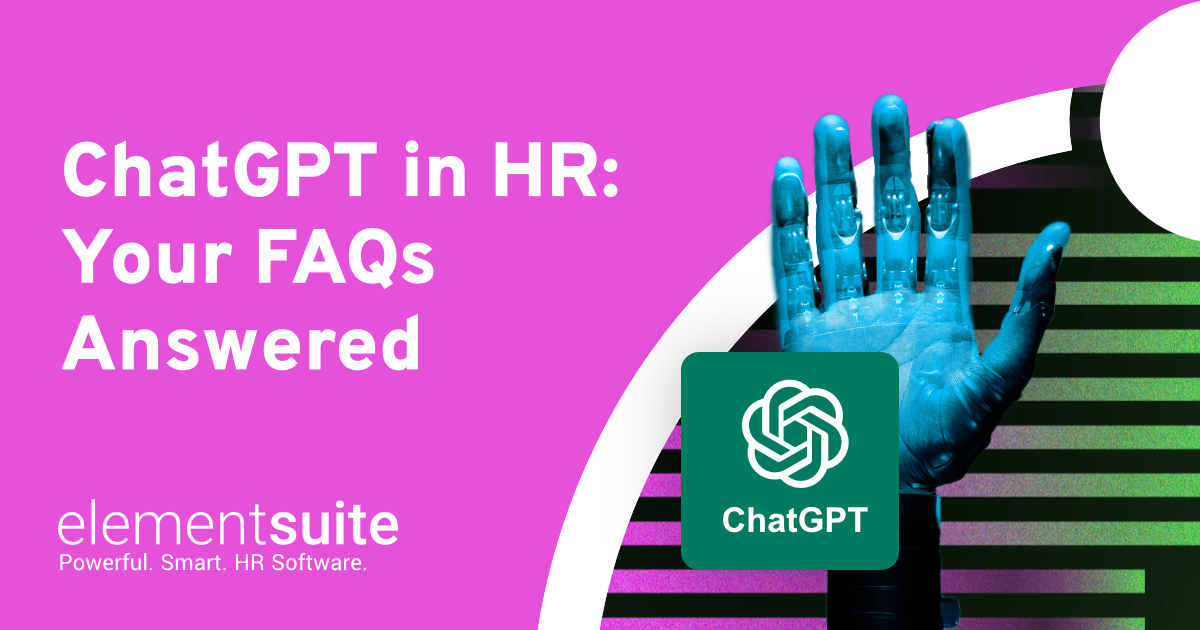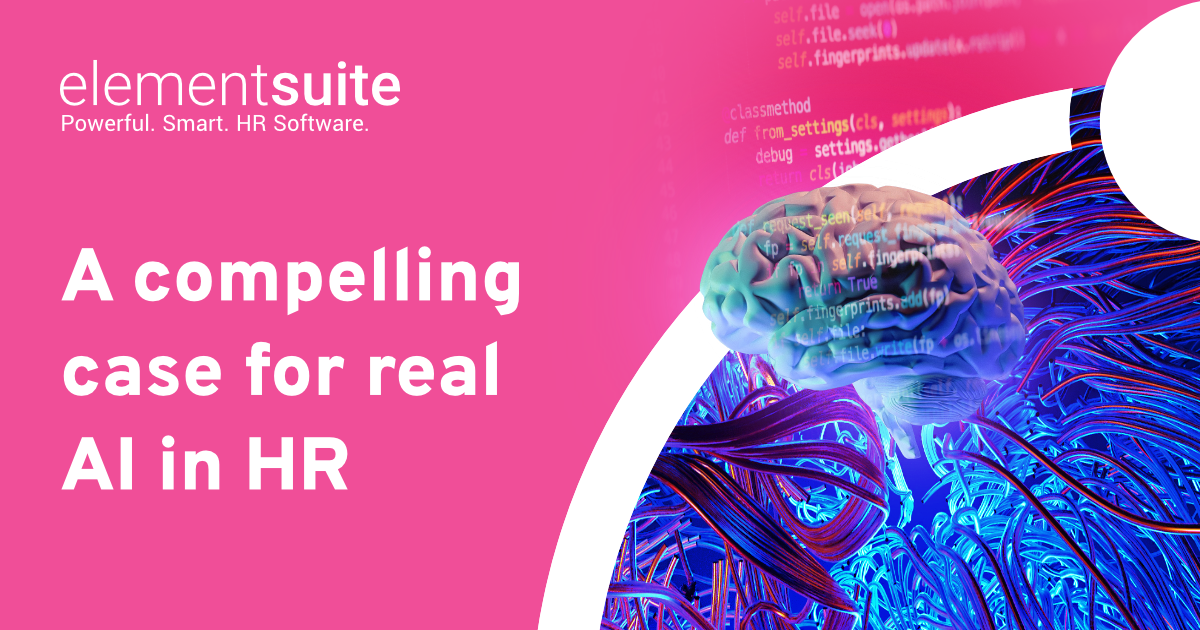It’s a dangerous thing to make predictions about the future.
Aside from the arrogance of it, the sheer randomness and chaos of market forces and future “unknown unknowns” seem to me to make the job of a prophet a difficult one. Five years ago, who’d have thought that COVID could manifest in the world? And who could have foretold its impact on humanity during the pandemic, and even more so, it’s subsequent impact on the workplace?
So when I was recently asked to write a post on “What are HR roles going to look like in a few years”, I choked on my cornflakes, baulked at the question and found every opportunity to procrastinate, feign headaches, and generally avoid the task. But something nudged me recently.
I’ve been busy looking into opportunities around Artificial Intelligence (AI) – and particularly the spectacular progress being made in Large Language Models (LLMs – as made manifest in ChatGPT) – and considering how this might affect elementsuite as a business and the HR marketplace in general.
It suddenly felt to me that the future was going to hit us harder and faster than we could possibly imagine, and that perhaps I ought to take the question of the future of work more seriously.
So I’ve decided to “face up to the future” and share a few thoughts, though I apologise in advance for my fumbling attempts to answer the question. The complex interplay of HR roles and the future, is of course a vast and sprawling subject, so I’ve tried to summarise it in terms of things I think will change, and things that won’t.
What will change?
Answers and output will be easier to get hold of through AI and robotic process automation – so the question for people in HR roles will be how to ask the right HR questions.
It is reckoned that 25% of current desk-based jobs that involve administration (which includes legal, HR, finance, professional services etc.) will be superseded by AI and automation – if you haven’t already noticed this tectonic ground shift – where have you been?!
The world was introduced to mainstream AI with the launch of ChatGPT in November 2022, but the technology underpinning the latest burst in AI innovation actually originated from a landmark research paper in 2017 called “Attention is all you need”.
Since then companies such as Microsoft, Google, OpenAI, and a plethora of other niche AI companies, have been putting into action the breakthroughs identified in that paper – namely that you can now interact with AI using human “natural” language. This has not just made AI accessible to the masses but opened up completely new thinking about the future of work.
What this means for HR in the future, is that the fundamental role of HR practitioners will not be to answer questions about the HR data in their organisation, like “what is our 90 day turnover rate?”. But rather to ask questions of AI models that answer the (more difficult) questions posed, like “what factors are influencing our 90 day turnover rate?”.
Asking questions instead of answering them will be a fundamental paradigm shift for HR, and these skillset changes will be important to adapt to – in order to ride the AI value wave. Data science, statistical analysis, AI terminology, and a basic understanding of training AI models to understand and perform tasks such as: question / answering, classification, sentiment analysis, semantic search, and automated responses or document generation – these are the critical skills for the future for the savvy HR practitioner.
Large language models will also pave the way for HR practitioners to use AI models to observe and extract the emergent features of non-language related HR data. This includes the individual probability of leaving, and correlations between productivity, turnover, absenteeism and engagement. There are also numerous statistical and abstract features and correlations that are not yet well understood in the HR universe, and for which we will need to create terminology and articulated language to explore.
This is a hugely exciting time to be an HR practitioner – it’s important to fully understand and embrace the opportunities, whilst being mindful of the intrinsic dangers of HR data protection breaches. Human resources must learn to align (i.e. play nicely) with AI and robotic resources – the barriers to using AI in the workplace are lower than ever, and will become increasingly prevalent as inevitable further advances are made.
What won’t change?
In a world of de-humanising technology, the counterbalance of demonstrating humanity in the workplace will become an essential HR role in the differentiation of successful companies.
With all the seismic technology changes, and emergence of AI and robotic process automation to take away mundane work, humans will increasingly be aware of what it is to be human. Human consciousness and existence in all its glorious and chaotic technicolour will become a critical feature of the workplace. Boring desk work will give way to creative and strategic workshops (with robots on hand to answer the questions identified). And whilst no doubt technologies such as Virtual Reality (VR) will become prevalent, the power of people dwelling together and interacting in a workplace will be ever more powerful.
Consider how you feel when you enter a rock concert or buzzing sports stadium. The assembling of people, united for, or celebrating a common purpose is palpable and powerful.
HR roles will increasingly need to become agents of assembly – bring people together to align purpose and vision – both at the macro level in organising creative or strategic workshops and events, and also in the micro level in understanding individual motivations and personal reward. The data science and automation behind understanding this will of course be important, but not nearly as important as the control of actions that demonstrate and reward humanity in the workplace.
Not everything can be done by a robot, and more than ever HR roles of the future will need to become ever more skilled at aligning employees to a common / higher purpose (hopefully aligned with the objectives of the company, and hopefully more than just financially oriented).
Conclusions
Humanity has always adapted to changing conditions (take COVID as an example) but the changes that are now affecting the workplace are more far reaching than most people (including I) understand.
HR Data Protection has always been important for HR practitioners and this area will become an increasingly evolved and sophisticated subject matter for HR to manage in light of AI advances.
But the genie has truly escaped from the AI bottle, and despite the best attempts of governments and regulations to slow it’s advancement, the profound impact of AI technologies on the workplace is only beginning to be understood. To adjust to their new roles in the workplace it’s important for HR practitioners to quickly embrace and understand the opportunities associated with AI and technological advances, whilst providing mature and measured framework policies along with a sound approach to data protection and governance. Alongside this, the human brain is not changing as rapidly as the modern technology that surrounds it, so basic human motivation, inspired by the power of people will become increasingly rarefied and important for companies to succeed. HR roles will need to be super powers to assemble the people to unleash the super power of HR. People power is still (and will always be) a thing.
The brave new HR world of the future will make the most of AI technology to take away mundane work, and reinvest the savings in the creativity of people to ask even harder questions of the AI they have instantiated. This virtuous cycle will require a broadening of the traditional HR skillset to include a more rigorous technology grounding – that includes data science, alongside workplace psychology, reward and possibly even the neuroscientific basis of work.
You have been warned… (but what do I know… )




